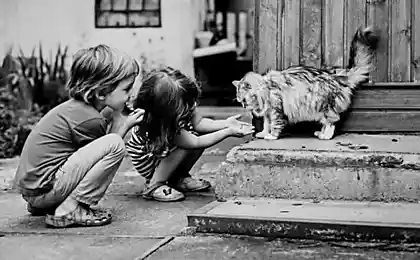486
Education of honesty — 6 tips

photo: © Elena Shumilova
Tip 1. Believe the child.
As a rule, children at the trust say the same thing and if in some cases it is cheating, then most likely, do not understand this.
Let the child knows and feels that you believe him.
For example, if you notice in their child aggression or pugnacity and before going out again: "try it, get groped in front today!", "Let you complain today!" — this forms a pattern of behavior, and how you unconsciously provoke these actions. In these cases it is better to say: "be calm and desist." It is important for the child to confide in you: keep the word given. But if you can't fulfill a promise, explain why and apologize.
Tip 2. Explain that truth "keeps the peace", the language of children: it is useful. People live in harmony, if you trust each other.
Try together to imagine a society where all are deceiving each other. Describe a situation of cheating and dishonest people: counterfeiters, swindlers, etc. Explain that dishonest people by and large lose: they don't trust, don't respect them.
The Council 3rd. Do not create situations for fraud. Avoid ambiguous questions, when it is easier to tell a lie than the truth.
If the child broke a Cup and you know it, or guess, don't ask him: "you broke the Cup?" or better say, "I know you broke a Cup, tell me how it happened." This certainty exclude the possibility of deception on the part of the child. Besides, if you are friendly, he had no reason to lie.
Too severe punishment at home, excessive demands and pressure from parents indicate a misunderstanding of the nature of the child's age characteristics and crisis. This can lead to the fact that the child will lie out of fear of trouble. Sometimes the child is cheating, feeling powerless to fulfil all that is required from a parent.
The Council of the 4th. Not uchinyat humiliating interrogations.
If the child is not immediately admitted, that to insist on questioning him was useless. As a rule, in this case, there is sparring. "No, it's not me!" "No, you admit it!" "No, not I" etc., is Better to explain that such actions are unacceptable and how it was possible to adequately get out of the situation. Depending on your principles of education, you can punish him (of course, without the use of a beating — I do not advocate harsh penalties). But if you are not sure that it was made by your child, in this case it is better to say: "I hope your words are true. If not, I'll be very upset".
Tip 5-th. Reward honesty. If your child confessed to you, show him his joy: "I'm glad you're an honest man, because you told the truth."
But here arises the most difficult situation: when the baby is admitted, what about the punishment for a misdemeanor? If you punish him, next time he may not admit it. If you will not be punished, he may not understand what he has done is forbidden. It is clear that in this case the punishment should be conditional. Give him the benefit of the doubt. Most importantly, show the negative consequences of his action, and explain how to avoid it. Let the child know that you are very upset and you hope that he will not disappoint.
The Council of the 6th. Set an example of honesty.
If you're asking me to answer the phone that you are not at home; if the train or bus, buying a child ticket, reference the five-year age of the child, although he was already seven; if you tell your wife that you have no money leaving a nest egg for a toy or for their needs, you justify the cases in which you can lie. Children assimilate everything, and honesty they will have the same relative.
Little kids don't understand double standards. If such a situation happened to you and the children witnessed, then be sure to explain to them the background events. Admit that you made a mistake by saying the truth that it's very frustrating, but sometimes it happens in life.
Source: talumala.com/ru/mir-semi/deti/vospitanie/5003-vospitanie-chestnosti























